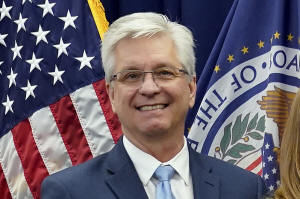Top Fed official backs new rate cuts even if Trump tariffs materialize
 Send a link to a friend
Send a link to a friend
 [January 09, 2025] By
CHRISTOPHER RUGABER [January 09, 2025] By
CHRISTOPHER RUGABER
WASHINGTON (AP) — A top policymaker at the U.S. Federal Reserve said
Wednesday that he still supports cutting interest rates this year,
despite elevated inflation and the prospect of widespread tariffs under
the incoming Trump administration.
Christopher Waller, an influential member of the Fed's board of
governors, said he expects inflation will move closer to the Fed's 2%
target in the coming months. And in some of the first comments by a Fed
official specifically about tariffs, he said that greater import duties
likely won't push up inflation this year.
“My bottom-line message is that I believe more cuts will be
appropriate,” Waller said in Paris at the Organization for Economic
Cooperation and Development.
“If, as I expect, tariffs do not have a significant or persistent effect
on inflation, they are unlikely to affect my view,” Waller added.
His remarks are noteworthy because the impact of tariffs is a wild card
this year for the U.S. economy. Financial markets have weighed down in
recent months partly on fears that inflation may continue to be an
issue, and that tariffs could make it worse. Producers tend to raise
prices for customers to offset the increased costs of tariffs on
imported materials and goods.

Yet Waller suggested that he is more optimistic about inflation than
many Wall Street investors.
“I believe that inflation will continue to make progress toward our 2%
goal over the medium term and that further (rate) reductions will be
appropriate,” Waller said. While inflation has been persistent in recent
months — it ticked up to 2.4% in November, according to the Fed's
preferred measure — Waller argued that outside of housing, which is
difficult to measure, prices are cooling.
Waller’s remarks run counter to increasing expectations on Wall Street
that the Fed may not cut its key rate much, if at all, this year with
high prices lingering. The rate is currently about 4.3% after several
reductions last year from a two-decade high of 5.3%. Financial markets
are expecting just one rate cut in 2025, according to futures pricing
tracked by CME Fedwatch.
Waller did not say how many cuts he specifically supports. Instead he
said that Fed officials projected two reductions this year, as a group,
in December. But he also noted that policymakers supported a wide range
of outcomes, from no cuts to as many as five. The number of reductions
will depend on progress towards reducing inflation, he added.
[to top of second column] |

Federal Reserve Board of Governors member Christopher Waller poses
for a photo on May 23, 2022, in Washington. (AP Photo/Patrick
Semansky, File)
 Fed Chair Jerome Powell has said
that the impact of tariffs on Fed policy and inflation is difficult
to gauge in advance, until it’s clearer which imports are hit with
tariffs and whether other nations retaliate with their own.
But at the Fed’s last press conference in December, Powell
acknowledged that some of the central bank’s 19 policymakers are
starting to incorporate the potential impact of President-elect
Donald Trump’s policies on the economy.
“Some people did take a very preliminary step and start to
incorporate highly conditional estimates of economic effects of
policies into their forecast at this meeting,” Powell said. Other
officials did not take such a step, he said, while some didn't
specify whether they did so.
Other Fed officials have recently suggested that the Fed will move
more slowly on rate cuts this year, after cutting at each of its
last three meetings in 2024.
Lisa Cook, a member of the Fed’s governing board, said Monday that
the central bank can “proceed more cautiously” with rate reductions.
Waller, in a question and answer session, said that one reason that
longer-term rates have risen is due to concern that the federal
government's budget deficit, already massive, could remain so or
even increase. Higher longer-term rates have pushed up the cost of
mortgages and other borrowing, putting increased pressure on both
businesses and consumers.
“At some point the markets are going to demand a premium to accept
the risk of financing” such increased borrowing, he said.
Later Wednesday, the Fed will release minutes from its December
meeting and that may shed more light on what policymakers were
thinking about inflation and the potential impact of tariffs.
All contents © copyright 2024 Associated Press. All rights reserved
 |